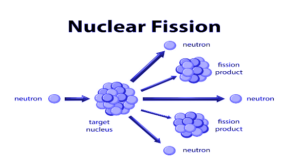Table of Contents

Introduction
Nuclear fission occurs when the nucleus of an atom breaks into lighter nuclei as a result of a nuclear reaction. This decay can be replicated in a lab by achieving the requisite conditions, or it can be natural spontaneous splitting by radioactive decay (bombarding with neutrinos). The aggregate mass of the resultant fragments is usually smaller than the original. In the aforementioned process, the missing mass is turned into nuclear energy. As a result, nuclear fission is defined as follows:
In nuclear physics, the process by which an atom’s nucleus splits into two daughter nuclei.
There are four main types of nuclear reactions as follows:
- Nuclear Fission
- Nuclear Fusion
- Nuclear Decay
- Transmutation
What is Nuclear Energy and How Does It Work?
Atoms are the building blocks of all matter. At their core, all atoms have a nucleus, which contains the majority of their mass. It is conceivable for this nucleus to undergo various alterations in specific conditions. Nuclear fusion (as the name implies) is the process of merging tiny atoms to produce heavier, more energetic atoms. Nuclear fission is the breaking of a heavier atom’s nucleus into a smaller one. Both of these processes produce a large quantity of energy.
Remember Albert Einstein’s famous formula
E = mc²
where,
The letters E and m stand for energy and mass, respectively.
c is the vacuum speed of light.
Despite the fact that the mass in question is so little, the speed of light is quite high (299792458 m/s). When this potential was discovered, the field of nuclear energy was born (literally the energy in the nucleus). Nuclear energy is defined as the energy released during nuclear reactions such as nuclear fission or nuclear fusion.
Nuclear energy has the advantage of being able to generate a large amount of energy/power without emitting any pollutants. The only drawback is that radioactive waste must be disposed of with considerable caution.
FAQs:
What is nuclear fission?
Nuclear Fission is a type of nuclear reaction that splits a nucleus into two daughter nuclei.
What is nuclear energy?
Nuclear energy is the energy released during nuclear reactions like nuclear fission or nuclear fusion.
What is a nuclear fusion reaction?
Nuclear fusion is a type of nuclear reaction in which two light nuclei combine to form a heavier one.
Do nuclear reactors use which type of reaction to generate electricity?
Nuclear reactors use nuclear fission reactions to generate electricity.
Ans. The following are the types of nuclear reactions:
- Nuclear Fission
- Nuclear Fusion
- Nuclear Decay
- Transmutation






